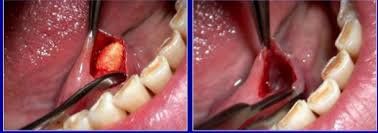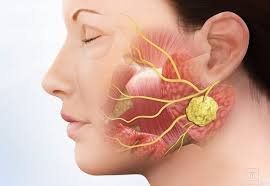This is an automatically translated article.
The article is professionally consulted by Doctor of Dental - Jaw - Facial - Department of Medical Examination & Internal Medicine - Vinmec Hai Phong International General Hospital.A salivary gland stone is a calcified structure that forms inside the salivary ducts. When the stone is large, the flow of saliva can be blocked, causing swelling and inflammation affecting the nerves in the face.
1. Risk factors for salivary gland stones
Salivary gland stones are not contagious, there are many factors that increase the risk of salivary stones, such as:People who have had radiation therapy to the head or neck. Have a history of oral trauma. Use of medications that affect saliva production, such as anticholinergics, antihistamines (antiallergics), blood pressure medications, psychiatric medications, and bladder control medications... Sjogren's syndrome Have kidney problems.
2. Are salivary gland stones dangerous?
Salivary gland stones can be completely treated, but in some cases it can be dangerous when the stones are removed without complications but continue to grow without intervention by removal. You are at risk for a salivary gland infection.
Sỏi tuyến nước bọt là một cấu trúc bị vôi hóa và hình thành bên trong ống dẫn tuyến nước bọt
3. Symptoms of salivary gland stones
Salivary stones do not usually cause symptoms during their forming phase, and sometimes they can go away on their own. The stones can vary in size, but they are usually hard and white.When the stones reach the size to block the duct, saliva flows back into the gland, causing pain and swelling. You may feel increased pain and swelling. The condition gradually got worse. Glandular inflammation, an infection in the gland may occur later.
Common symptoms of a blocked salivary gland include:
There is a painful lump under the tongue, or in other words, the sensation of the tongue being pushed up. Pain or swelling in the area under the jaw or in front of the ears Pain that increases with eating Saliva stones can also sometimes lead to infection in or around the affected gland. Symptoms of an infection can include fever and even pus formation around the stone.
4. Diagnosis of salivary gland stones
If you have symptoms of salivary gland stones, your doctor will first check for stones with a physical exam: Look at the glands, feel the outside of the gland, and also inside your mouth. Palpation along the Wharton tube sometimes shows stones often mixed in the oral mucosa, which is swollen, hard, hard, painful.Additional tests may also be supported such as: X-ray, CT scan.
5. Treatment of salivary gland stones
5.1 Non-surgical treatment Laparoscopy of the salivary glands: This method is painless, so there is no need for anesthesia or anaesthesia. Extracorporeal salivary stone lithotripsy: Using a microsurgery instrument that emits electromagnetic shock waves to break up stones without causing damage to glandular tissue. This method is completely painless and does not require anesthesia. Medical Treatment: Antispasmodics make it easier for saliva to escape. Broad-spectrum antibiotics to fight infection and prevent superinfection. Anti-inflammatory and pain reliever. 5.2 Surgical treatment Conventional stone removal: when the stone is solitary and located near the mouth of the salivary duct. Need local anesthesia Salivary gland removal surgery: Root treatment Remove the submandibular gland, prevent nerve damage (facial, tongue, sublingual nerves), then sew each layer and drain the drainage. .
Phẫu thuật là phương pháp điều trị sỏi tuyến nước bọt tận gốc
Please dial HOTLINE for more information or register for an appointment HERE. Download MyVinmec app to make appointments faster and to manage your bookings easily.













